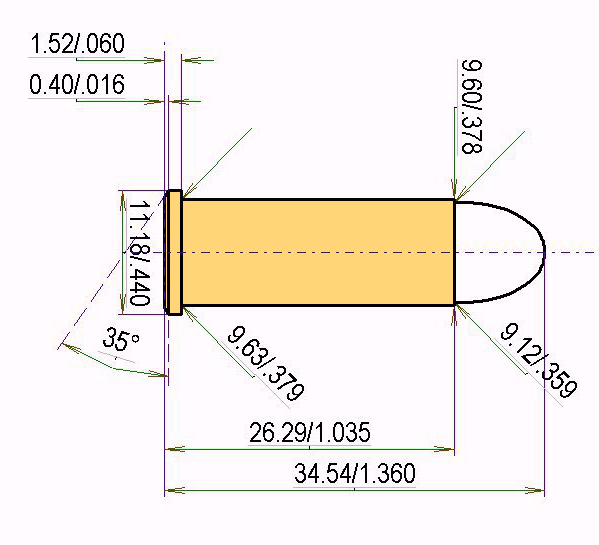Load data for caliber ".38 Long Colt"
The .38 Long Colt is a revolver cartridge that was introduced in 1875 and was used by the United States military from 1892 to 1909. It was designed by Colt's Manufacturing Company and was intended to be a replacement for the .36 caliber percussion revolvers that were then in use.The .38 Long Colt cartridge has a bullet diameter of .357 inches and a case length of 1.06 inches. It has a relatively low velocity of around 800 feet per second, which limits its effectiveness for self-defense or military use.
While the .38 Long Colt was once a popular cartridge, it has largely been replaced by more modern cartridges with better ballistics. Today, it is primarily used by enthusiasts of antique firearms and for historical reenactments.
You find .38 Long Colt with all common powders and bullets by clicking the 'Loads in this caliber' button above.
Technical Specifications (based on the respective safety standard - see more details in tab 'Datasheet' if available)
| Caliber: | .38 Long Colt |
|---|---|
| Cartridge Type: | Pistol/Revolver |
| Bullet Diameter: | 0.353 '' | 8.97 mm |
| Primer Size: | Small Pistol (SP) |
| Max. Case Length (l3): | 1.03'' | 26.29 mm |
| Max .Cartridge Length / OAL: | 1.36'' | 34.54 mm |
| Maximum Standardized Pressure: | 13053.6 psi | 900 bar |

C.I.P.
The Commission internationale permanente pour l'épreuve des armes à feu portatives ("Permanent International Commission for the Proof of Small Arms" – commonly abbreviated as C.I.P.) is an international organisation which sets standards for safety testing of firearms. (The word portatives ("portable") in the name refers to the fact the C.I.P. tests small arms almost exclusively; it is ordinarily omitted from the English translation of the name.) As of 2015, its members are the national governments of 14 countries, of which 11 are European Union member states. The C.I.P. safeguards that all firearms and ammunition sold to civilian purchasers in member states are safe for the users.
To achieve this, all such firearms are first proof tested at C.I.P. accredited Proof Houses. The same applies for cartridges; at regular intervals, cartridges are tested against the C.I.P. pressure specifications at the ammunition manufacturing plants and at C.I.P. accredited Proof Houses.

